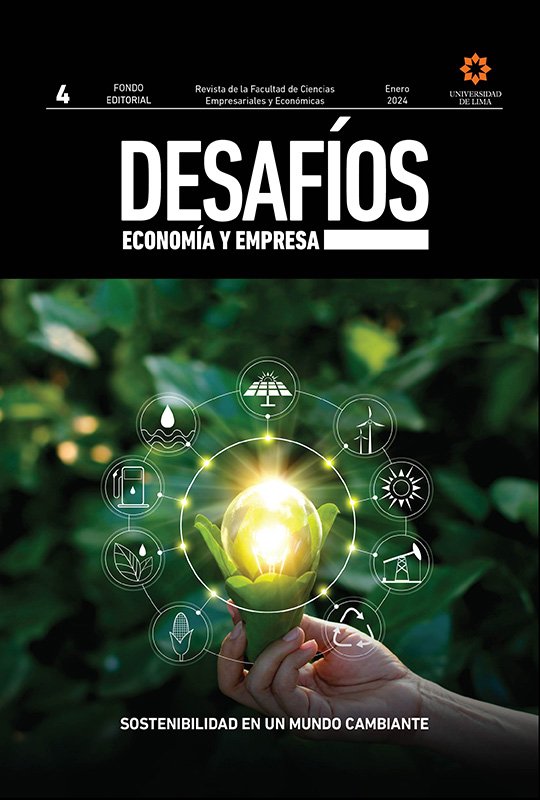El impacto del consumo de energía en el crecimiento económico: Un análisis con datos de panel
DOI:
https://doi.org/10.26439/ddee2024.n04.6247Palabras clave:
consumo de energía renovable, matriz de energía, crecimiento económico, datos de panel, modelo de efectos fijosResumen
El presente estudio analiza el rol del consumo de energía desagregado en el crecimiento de las economías industrializadas con mayor consumo de energía, las cuales representan el 60 % del consumo mundial. Los resultados, tras la estimación con errores estándar corregidos para panel, apuntan a una relación positiva y significativa entre cuatro tipos de energía (petróleo, carbón, gas natural y energía renovable) y el crecimiento del PBI. El consumo de petróleo genera el efecto de mayor magnitud en el crecimiento económico, mientras que la energía renovable tendría el menor impacto. Frente a ello, se recomienda ser prudentes con respecto a políticas conservacionistas que podrían afectar negativamente el crecimiento económico, pero se sugiere el cambio paulatino en la matriz energética hacia fuentes menos contaminantes como la energía renovable. Este estudio proporciona evidencia empírica del rol del consumo de energía en el crecimiento de las economías industrializadas y su impacto diferencial según el tipo de energía.
Descargas
Referencias
Beck, N., & Katz, J. (1995). What to do (and not to do) with time-series cross-section data. The American Political Science Review, 89(3), 634-647. https://doi.org/10.2307/2082979
Behname, M. (2011). Studying the relationship between coal consumption and economic growth in the Greater Middle East. Society of Interdisciplinary Business Research (SIBR) 2011 Conference on Interdisciplinary Business Research.
Breusch, T., & Pagan, A. (1980). The Lagrange multiplier test and its applications to model specification in econometrics. The Review of Economic Studies, 47(1), 239-253. https://doi.org/10.2307/2297111
Can, H., & Krasteva, G. (2017). Assessment of relations between renewable energy and economic growth in Bulgaria-VAR analysis. New Knowledge Journal of Science, 6(3), 51-61. https://doi.org/10.3390/su10082626
Energy Information Administration. (2019). International energy outlook 2019 with projections to 2050. https://www.eia.gov/outlooks/ieo/pdf/ieo2019.pdf
Fadiran, G., Adebusuyi, A., & Fadiran, D. (2019). Natural gas consumption and economic growth: evidence from selected natural gas vehicle markets in Europe. Energy, 169, 467-477. https://doi.org/10.1016/j.energy.2018.12.040
Greene, W. (2000). Econometric Analysis. Pearson.
Gozgor, G., Lau, C., & Lu, Z. (2018). Energy consumption and economic growth: new evidence from the OECD countries. Energy, 153, 27-34. https://doi.org/10.1016/j.energy.2018.03.158
Hassan, M. S., Tahir, M. N., Wajid, A., Mahmood, H., & Farooq, A. (2017). Natural gas consumption and economic growth in Pakistan: production function approach. Global Business Review, 19(2), 297-310. https://doi.org/10.1177/0972150917713533
Hausman, J. (1978). Specification tests in econometrics. Econometrica, 46(6), 1251-1271. https://doi.org/10.2307/1913827
Inglesi-Lotz, R. (2016). The impact of renewable energy consumption to economic growth: A panel data application. Energy Economics, 53, 58-63. https://doi.org/10.1016/j.eneco.2015.01.003
Jin, T., & Kim, J. (2018). Coal consumption and economic growth: panel cointegration and causality evidence from OECD and non-OECD countries. Sustainability, 10(3), 660-674. https://doi.org/10.3390/su10030660
Lahiani, A., Benkraiem, R., Miloudi, A., & Shahbaz, M. (2019). New evidence on the relationship between crude oil consumption and economic growth in the US: a quantile causality and cointegration approach. Journal of Quantitative Economics, 17(2), 397-420. https://doi.org/10.1007/s40953-018-0147-2
Liu, X. (2018). Aggregate and disaggregate analysis on energy consumption and economic growth nexus in China. Environmental Science and Pollution Research, 25(26), 26512-26526. https://doi.org/10.1007/s11356-018-2699-2
Marques, A. C., & Fuinhas, J. A. (2012). Is renewable energy effective in promoting growth? Energy Policy, 46, 434-442. https://doi.org/10.1016/j.enpol.2012.04.006
Menegaki, A. N. (2011). Growth and renewable energy in Europe: a random effect model with evidence for neutrality hypothesis. Energy Economics, 33(2), 257-263.
Menegaki, A. (2018). The economics and econometrics of the energy-growth nexus. Academic Press.
Newell, R., Raimi, D., & Aldana, G. (2019). Global energy outlook 2019: the next generation of energy (Report 19-06).
Olarinde, O., & Adeniran, A. (2018). Addressing the energy consumption-economic growth nexus: The Nigerian case. Journal of Sustainable Development Law and Policy, 9(2), 84-100. https://doi.org/10.4314/jsdlp.v9i2.6
Omri, A. (2014). An international literature survey on energy-economic growth nexus: Evidence from country-specific studies. Renewable and Sustainable Energy Reviews, 38, 951-959. https://doi.org/10.1016/j.rser.2014.07.084
Ozturk, I., & Al-Mulali, U. (2015). Natural gas consumption and economic growth nexus: panel data analysis for GCC countries. Renewable and Sustainable Energy Reviews, 51, 998-1003. https://doi.org/10.1016/j.rser.2015.07.005
Payne, J. (2010). Survey of the international evidence on the causal relationship between energy consumption and growth. Journal of Economic Studies, 37(1), 53-95. https://doi.org/10.1108/01443581011012261
Sasana, H., & Ghozali, I. (2017). The impact of fossil and renewable energy consumption on the economic growth in Brazil, Russia, India, China and South Africa. International Journal of Energy Economics and Policy, 7(3), 194-200. https://www.econjournals.com/index.php/ijeep/article/view/4926
Squalli, J. (2007). Electricity consumption and economic growth: Bounds and causality analyses of OPEC members. Energy Economics, 29(6), 1192-1205. https://doi.org/10.1016/j.eneco.2006.10.001
Wolde-Rufael, Y. (2010). Coal consumption and economic growth revisited. Applied Energy, 87(1), 160-167. https://doi.org/10.1016/j.apenergy.2009.05.001
Wooldridge, J. (2002). Econometric analysis of cross section and panel data. The MIT Press.
Yu, E., & Choi, J. (1985). The causal relationship between energy and GNP: an international comparison. The Journal of Energy and Development, 10(2), 249-272. https://www.jstor.org/stable/24807818
Zhi-Guo, L., Cheng, H., & Dong-Ming, W. (2018). Empirical research on the relationship between natural gas consumption and economic growth in the Northeast Asia. Energy & Environment, 29(2), 216-231. https://www.jstor.org/stable/26960216
Ziramba, E. (2015). Causal dynamics between oil consumption and economic growth in South Africa. Energy Sources, Part B: Economics, Planning, and Policy, 10(3), 250-256. https://doi.org/10.1080/15567249.2010.540626



